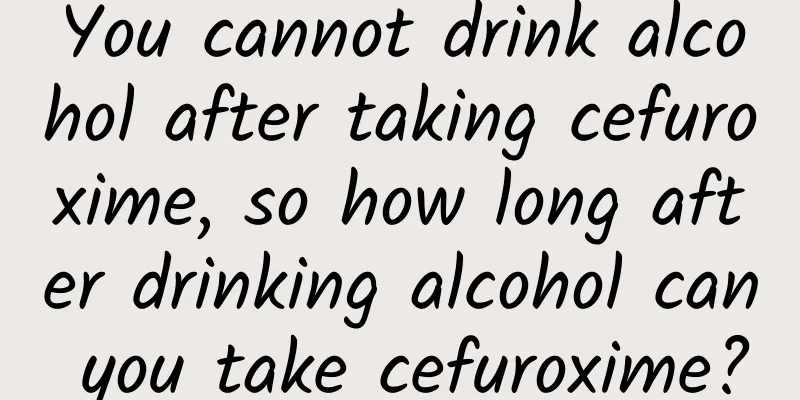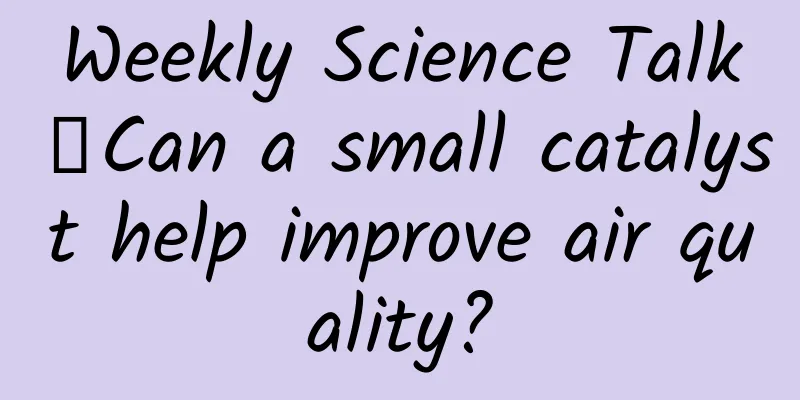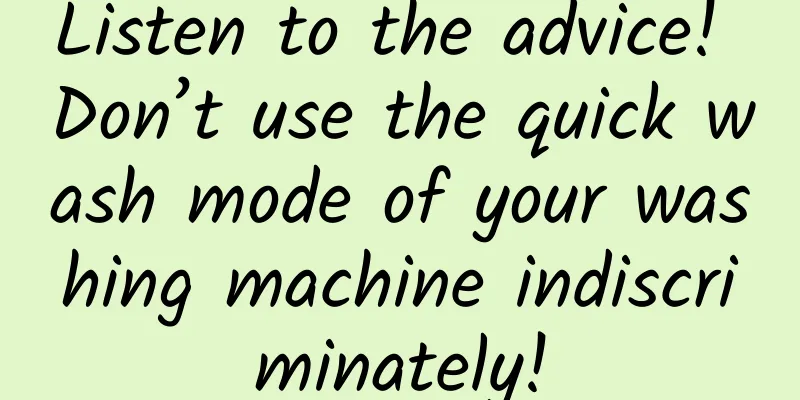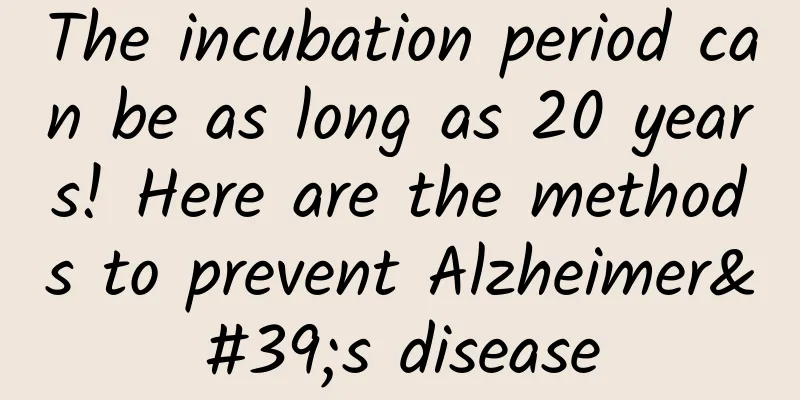You cannot drink alcohol after taking cefuroxime, so how long after drinking alcohol can you take cefuroxime?

|
China's Spring Festival happens to be in the winter when respiratory diseases are prevalent. There are many cases where people need treatment due to infection with certain fungi after drinking. How long after drinking can cephalosporin antibiotics be used is an important issue. Written by Li Changqing The "cephalosporin and alcohol" incident involving talk show host Yang Bo has turned the disulfiram reaction, a medical topic originally worth discussing during the Spring Festival, into a hot topic in advance. Since Yang Bo publicly stated on Weibo that "except for a little stomach discomfort, nothing happened" after taking "cephalosporin with alcohol", many popular science articles have focused on how serious the consequences of "cephalosporin with alcohol" are, under what circumstances will serious problems occur, whether people will die, and other extreme situations. Most people may know that they cannot drink alcohol within a certain period of time after taking cephalosporin antibiotics, but as the Spring Festival approaches, there is another question that really needs to be discussed, that is, if a person develops an infection after drinking and needs treatment, can cephalosporin antibiotics still be used? This topic has been discussed before. In early summer 2019, an "encounter" of Ling Feng, chief expert at Beijing Xuanwu Hospital, was widely reported in the media and self-media. The content was basically a self-report of her emergency treatment in December of the previous year when she took cephalosporin antibiotics after drinking and developed symptoms. Dr. Ling believed that this incident might be caused by a disulfiram reaction, because she drank a glass of red wine the day before the accident. The related news also used this as the title: "How terrible is it to take cephalosporin after drinking? ! Doctor Ling Feng's 24 hours of life and death". At that time, many doctors pointed out that Dr. Ling’s condition was most likely a drug allergy rather than a disulfiram reaction. The reasons were: first, the cefuroxime that Dr. Ling took did not contain the chemical structure that could cause a disulfiram reaction; second, Dr. Ling’s symptoms were more like a typical allergy rather than a disulfiram reaction; third, disulfiram reactions mostly occurred after taking cefuroxime and then drinking alcohol, and generally would not occur when a person had drunk alcohol without any symptoms of drunkenness and then took the medicine after a period of time. However, the media’s focus was on the disulfiram reaction, with some articles suggesting that “taking cefuroxime after drinking alcohol is dangerous” and “you cannot drink alcohol within a week after taking the medicine, and you cannot take cefuroxime within a week after drinking alcohol.” Not to mention that Dr. Ling’s illness was probably unrelated to drinking alcohol, even if it was related, the suggestion that there must be a one-week interval between taking the medicine and drinking alcohol has no scientific basis. Spreading wrong advice based on wrong cases is a mistake on top of a mistake. The interaction between drugs and alcohol in the metabolic process is very complex, and there is no time interval limit that is suitable for all drugs. For disulfiram, the main cause of disulfiram reaction, the Mayo Clinic recommends not drinking alcohol during disulfiram medication and within two weeks after stopping the medication. Metronidazole, a common antibiotic that can cause disulfiram reaction, requires that you stop taking it for 48 hours before drinking alcohol. The most discussed cephalosporin antibiotics are much more complicated. Some drugs are considered not to react with alcohol and can be taken safely, such as the commonly used cephalexin. For other more common cephalosporin antibiotics that cause disulfiram reactions, such as cefoperazone, the drug instructions indicate that drinking alcohol during medication and within five days after stopping the medication may cause reactions. The essence of the disulfiram reaction is that the drug affects the metabolism of alcohol and the intermediate product of alcohol metabolism, acetaldehyde, accumulates in large quantities. Therefore, the symptoms are basically the same as those of drunkenness, including nausea, dizziness, and flushed face. In severe cases, coma and hypotension may occur. Since the principle is that the drug affects the metabolism of alcohol, it can be known that symptoms usually occur when drinking alcohol while taking the drug or when the drug has not been completely metabolized after taking the drug. If you drink alcohol first, the alcohol has not been completely metabolized, and you are still in a drunken state, you will also have a reaction when taking the medicine at this time. However, for most people, alcohol is metabolized within one or two days after drinking, and basically no longer has symptoms of drunkenness. At this time, there is no need to worry about disulfiram reaction when taking medication. The medication to be used should be based entirely on clinical needs. In addition, for chronic alcohol abusers, because long-term drinking induces the liver's metabolic enzyme system, it will accelerate the metabolism of many drugs in the body. When medication is needed, not only should the medication not be stopped or reduced, but the dosage should be increased, including antibiotics. Therefore, even for antibiotics that can produce a disulfiram reaction, it is not necessary to wait a week after stopping the medication for most of them. However, considering that antibiotics must be taken, but alcohol is not necessary, it is a good thing to drink less. To be on the safe side, it is not a bad idea to uniformly require that alcohol should not be consumed during medication and within a week of stopping the medication. There are also other drugs that recommend abstaining from alcohol for longer than a week after stopping the medication. The problem lies in the advice not to use antibiotics one week after drinking. This advice is not only incorrect, but may also affect the normal treatment of the disease. If a patient has a bacterial infection that happens to be sensitive to antibiotics associated with disulfiram reaction, refusing to use the corresponding antibiotics because of such advice may have a negative impact on the treatment of the disease. China's Spring Festival happens to be in the winter when respiratory diseases are prevalent. There are many cases where people are found to be infected with some kind of bacteria within a few days after drinking and need to use antibiotics. I hope everyone will not be misled by wrong advice. This article is supported by the Science Popularization China Starry Sky Project Produced by: China Association for Science and Technology Department of Science Popularization Producer: China Science and Technology Press Co., Ltd., Beijing Zhongke Xinghe Culture Media Co., Ltd. Special Tips 1. Go to the "Featured Column" at the bottom of the menu of the "Fanpu" WeChat public account to read a series of popular science articles on different topics. 2. Fanpu provides a function to search articles by month. Follow the official account and reply with the four-digit year + month, such as "1903", to get the article index for March 2019, and so on. Copyright statement: Personal forwarding is welcome. Any form of media or organization is not allowed to reprint or excerpt without authorization. For reprint authorization, please contact the backstage of the "Fanpu" WeChat public account. |
>>: No weather forecast? This is how the ancients predicted the weather...
Recommend
[Grain Policy of a Great Country] The seafood freedom of this generation of young people depends on the "smart factory" in the sea
The Central Government's No. 1 Document for 2...
Alpha Egg AI Dictionary Pen X10: A personal tutor in a pencil case
In today's internationalized era, English pro...
A practical course on color business that goes beyond teaching matching
A practical course on color business that teaches ...
A girl born in the 1990s makes 70,000 yuan a month by making Hanfu for cats. Why are Hanfu for cats so popular?
A girl born in the 1990s makes 70,000 yuan a mont...
5 Tips for Using Tik Tok to Master Film and Television Marketing!
Since Tik Tok became popular, there is another ne...
2022 Ningbo Tea Studio is recommended to all friends
Ningbo Tea Studio recommends high-end tea SPA in-...
Folding screens and 5G are just appearances. Mobile phone manufacturers have entered the era of "technology futures"
Seven or eight years ago, Internet brand mobile p...
Do refined carbohydrates pose health risks? How should we “eat well”?
Nowadays, people's eating is no longer limite...
What does Doraemon, who has big buck teeth, hide in his pocket?
Australia is a magical land. There are kangaroos,...
How much does it cost to customize the Wenzhou e-book mini program?
WeChat Mini Program is an application that users ...
iPhone 8/8 Plus real machine pictures, iPhone X real machine pictures and hands-on videos
While everyone was shouting that the iPhone X was...
2-year-old boy found 6 live worms in his eyes! Change these habits now...
Expert in this article: Li Mingwu, Chief Physicia...
El Nino alert! Is the hottest year in history coming?
Recently, people in many areas have found that it...
5 steps to teach you how to minimize user acquisition costs!
Many startups are interested in trying to discove...
How New Year's Eve became a mobile carnival
The just concluded Spring Festival Gala of the Ye...









